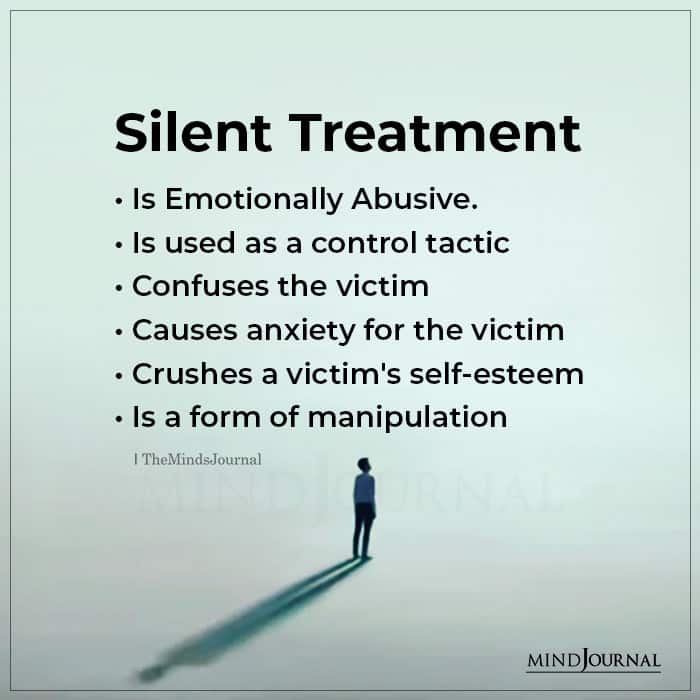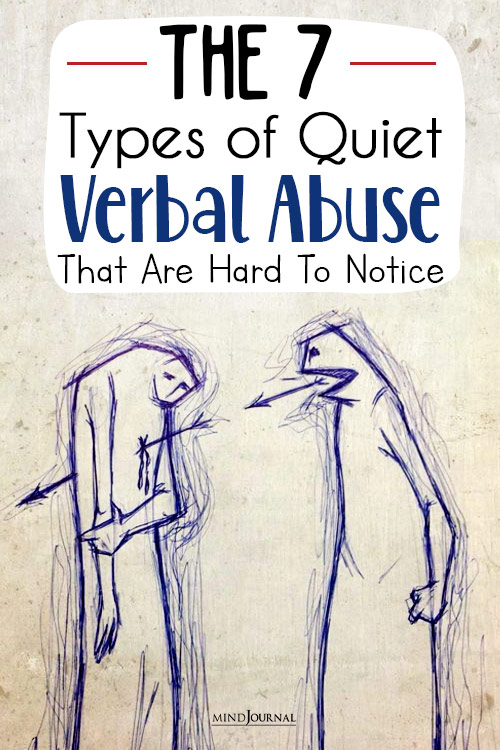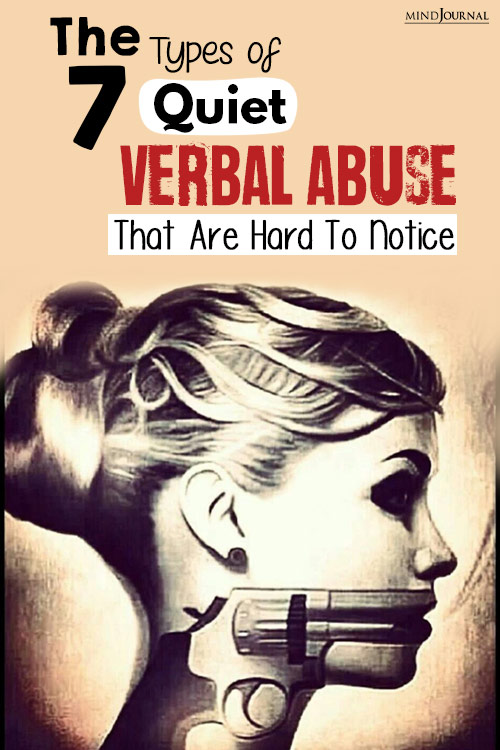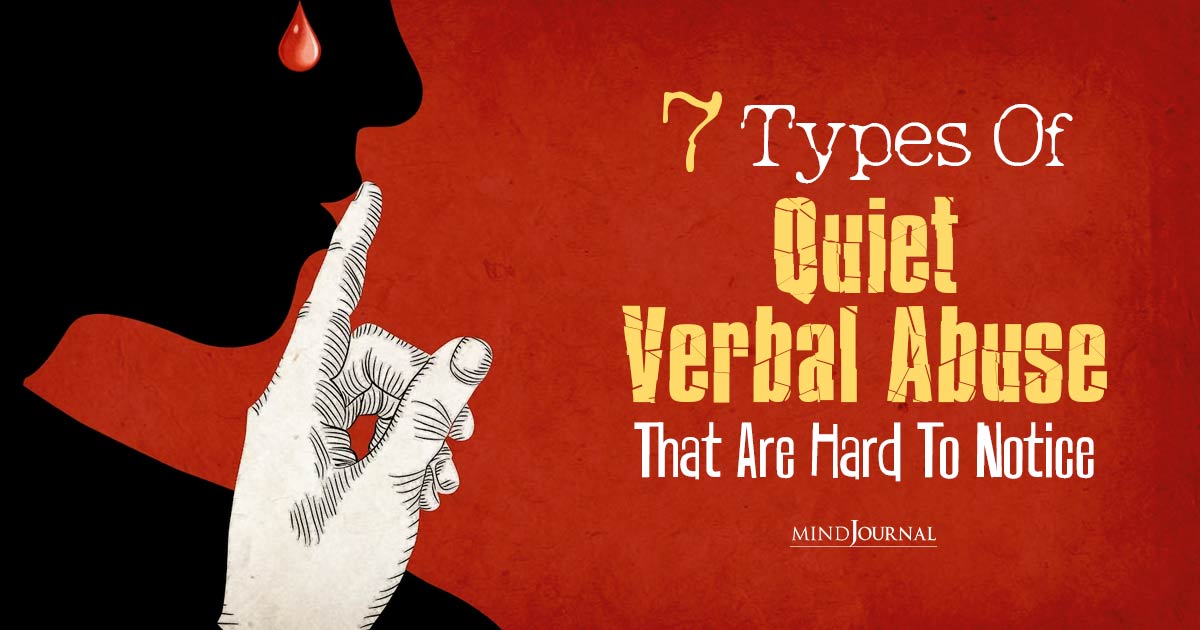What is the first thing that comes to mind when you hear the term ‘verbal abuse’? Screaming, shouting, abusing, and name-calling, right? Even though these are forms of verbal abuse, there is something called quiet verbal abuse.
Abuse is not always that straightforward and quiet verbal abuse can have the same impact on your psych nevertheless.
When you’re on the other side of subtle verbal abuse, the abuser doesn’t always have to scream at you or call you horrible names to make you feel bad about yourself; they can shatter your heart into pieces without saying a single word and simply through their subtle abusive actions.
So, how does it work exactly? How would you know that you’re being subjected these types of quiet verbal abuse? Let’s find out.
Related: Eight Mental Abuse Tactics To Watch Out For
The 7 Types Of Quiet Verbal Abuse That Are Hard To Notice
1. Gaslighting.
When someone makes you question your reality and tries to convince you that what you experienced never happened in the first place, that is when you’ll know that you are being gaslighted.
Gaslighting is one of the most powerful weapons of abusers and manipulators, which makes it one of the most horrible types of quiet verbal abuse.
Some of the most common gaslighting phrases are as follows:
- “You are crazy, and you’re making things up!”
- “Come on, that never happened.”
- “You are just too sensitive.”
- “You must have heard it wrong.”
- “You pushed me to react this way.”
- “Why do you always have to be so emotional all the time? You need to chill!”
- “I was just joking!”
- “You can leave if you think I am such a bad person!”
- “You don’t have to be so dramatic all the time.”
- “You don’t know what you’re talking about.”
- “You are exaggerating and twisting things.”
- “There’s something wrong with you, that’s why you’re blaming me for it.”
- “No one likes you.”
- “You always need something to complain about!”
- “Don’t be a negative Nancy!”
So you see? There’s no name-calling, no abusive words per se, but it can still make you doubt yourself and even believe that you’re the culprit, not them. By gaslighting you, they completely change the narrative and pin the whole blame on you, and because they know all your weak points, they know what to say that will hurt you the most.
The whole motive of gaslighting is to make you doubt your sanity and sense of reality, and the moment you do that, they win. Gaslighting is one of the most horrible forms of subtle verbal abuse.
2. Absence Of Emotional Support, Validation And Love.
Many people have a tough time expressing their feelings to their loved ones, and that’s okay. But what’s not okay is withholding your appreciation, praise, emotional support, and kind words just because you don’t want to encourage and compliment someone. Many toxic parents do this to their children, in the name of ‘tough love’.
They always criticize, undermine, and humiliate their children because they want them to be strong and more successful, but what they don’t understand is that negative reinforcement alone doesn’t achieve anything.
Positive reinforcement, positive validation, and support are non-negotiable. Lack of acknowledgment and love can make anybody feel that they don’t deserve love, or that they have to earn that love.
Invalidating your emotions and beliefs and making you feel like you are never good enough, and will never be good enough is one of the most painful forms of emotional and quiet verbal abuse and one that stays with you for the rest of your life. It’s slight and profound at the same time.
3. Silent Treatment.
One of the worst types of quiet verbal abuse for sure is this.
Silent treatment might not be seen as emotional abuse, but it is indeed another form of emotional manipulation. Ignoring someone completely by hitting them with complete silence is not just an emotionally painful thing to go through, it can also make you doubt yourself and can wreak havoc on your self-esteem.
Ignoring someone and making someone feel as if they don’t matter is nothing short of emotional neglect and emotional indifference. Feelings of worthlessness, loneliness, and low confidence seeps in, and before you know it, you start blaming yourself for everything.
You tell yourself that you deserve what’s happening to you, and the way they are treating you is exactly the way you should be treated.
You question yourself, berate yourself and constantly put yourself down, and you keep on punishing yourself like this till the time they come back and behave as if nothing happened.
You feel grateful that they are back in your life, and ‘thank your stars’ that they chose to forgive you for your ‘mistakes’. On the other hand, they continue to exploit your lack of self-worth and confidence and make sure that you never believe in yourself ever again.

4. Criticising Everything You Do.
Positive criticism and constructive criticism are good things, as these can help you improve yourself and be better. But being overly critical is not the same thing.
Criticizing someone about anything and everything never yields any good results, rather it can make them feel as if they can never do anything right. Endless and excessive criticism always does more harm than good in the long run.
Even though an abuser might say that they just want what’s good for you, criticizing you all the time only has one aim – degrade and humiliate you to the point that you start to lose confidence in yourself.
This is one of the most potent forms of emotional abuse and emotional manipulation which slowly serrates your emotional peace and leaves you on edge all the time.
Because you’re so used to getting insulted and picked apart, you start believing their harsh words, and with time internalize all the horrible things they say to you and about you. You don’t just lose your confidence, you also lose your dignity and slowly drown in a spiral of guilt, shame, and unhealthy self-deprecation.
Related: Red Flags of Rage: 10 Characteristics Of An Aggressive Person
5. Condescending And Sarcastic Attitude.
If your partner is always behaving haughtily with you and passes sardonic comments about you at the drop of a hat, then don’t take it lightly.
Occasional sarcasm is fine, but if it becomes a regular affair where your partner is always mocking you and ridiculing you, then that’s a form of quiet verbal abuse.
When they start insulting you and putting you down in front of others in the name of ‘humor’, that’s unhealthy. If you’re the constant butt of jokes, then that’s a red flag and don’t take it lying down or think that they are simply ‘joking around’.
Condescending attitude, constant sarcastic remarks, and ridicule don’t exist in normal, healthy relationships. So, if you are being subjected to this, see it for what it truly is: subtle verbal abuse.
6. Stonewalling.
Stonewalling might not seem like a big deal to the people who engage in it, but the person who is on the opposite side of it knows how horrible it feels.
Stonewalling means refusing to talk to another person, leaving the room, or deliberately ignoring them in the middle of an argument. It is one of the most toxic forms of subtle abuse, and one that can make you feel extremely annoyed, frustrated, and insulted.
Some of the indicators of this sort of quiet verbal abuse are as follows:
- Deliberately changing the topic when they don’t want to deal with it.
- Refusing to answer questions, even if they are logical and justified ones.
- Ignoring the other person.
- Behaving in a passive-aggressive manner.
- Making ad hominem attacks to avoid talking about the actual problem.
- Leaving the room in the middle of an argument.
- Declining to accept the fact that they are stonewalling you, rather they will say something like, “I need a break!”.
- Being indirectly dismissive by gesticulating and closing or rolling their eyes.
Stonewalling can have a major impact on a person’s psyche and is one of the most painful forms of emotional abuse and subtle verbal abuse.
It’s a way of manipulating you into giving up on what you believe in and ignoring your own feelings so that they can feel vindicated. When a person stonewalls you, always remember it’s more about them than you.
7. Passive-Aggressive Behavior.
Passive-aggressive behavior is when someone indirectly expresses their anger and contempt towards you but refuses to talk about it openly. For people who behave like this, there’s a sense of detachment between how they feel and how they express themselves.
For example, if you have an argument with your spouse, on the surface they may pretend that they are fine, but they will show their anger in subtle ways, such as procrastination, backhanded compliments, sulking, or refusing to communicate.
Passive-aggressive behavior often involves:
- Tendency to blame others for their problems.
- Throwing vague and veiled criticisms your way.
- Annoyance, bitterness and resentment when someone approaches them for any help.
- Stubborn, misanthropic attitude.
- Frequently complaining about how they are always underappreciated, disrespected, and misunderstood.
- Depending on others to make them happy all the time.
- Expecting you to magically understand what they are feeling and thinking, and if you don’t, you’re ‘inconsiderate’.
- Deliberately making mistakes, botching up stuff, and giving a bad performance, in case they are made to do something they didn’t want to do.
Related: Why Narcissists Use Stonewalling As a Nasty and Powerful Defence Mechanism
When someone is behaving passive-aggressively with you, they are telling you, in a way, that you don’t deserve to know what they are thinking or feeling. Showing passive-aggressive behavior is just another way of tormenting you and teaching you a lesson for not doing what they wanted you to do.
Want to know more about subtle signs of verbal and emotional abuse? Check this video out below!
If any of these patterns or even some of these patterns seem like a part of your relationship, then don’t brush it under the carpet thinking it’s nothing.
Abuse is abuse, and even though it might not always be prominent, or in-your-face, know that it’s never okay to try and make your peace with it. If you are going through any of this, then call it out immediately and put a stop to it. Abuse is never okay.
Have you experienced any of these forms of quiet verbal abuse? Let us know your thoughts in the comments down below!














Leave a Reply